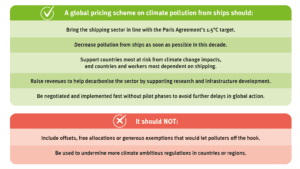
A worldwide shipping carbon pricing scheme must reduce pollution fast, finance technologies that reduce more emissions, and support countries most impacted by climate change. It must not include offsetting nor be allowed to weaken national or regional measures.
The global shipping sector is still not paying for the climate damage it is causing. While carbon pricing discussions are picking up speed again at the UN shipping agency IMO, the recently concluded talks on short-term measures don’t give much hope of a swift process that would yield effective results. After years of snail-paced negotiations, last November, governments agreed to allow climate pollution from ships to grow for another decade.
Our latest briefing outlines recommendations for a carbon pricing scheme that would help bring the shipping sector in line with global efforts to avoid a climate breakdown.
 Why we need to act – now
Why we need to act – now
According to a study by the IMO, ships are already responsible for approximately 3% of global climate pollution. Without imminent action, emissions are set to rise well into the next decade. This worrying trend means that the sector is falling far behind the decarbonisation targets set in the Paris Agreement and the IMO’s own climate strategy, as well as the recommendations by the UN climate science body IPCC.
There are different ways through which a carbon price on the global maritime sector could move this industry towards a climate-friendly future. First of all, it would drive behavioural change when it becomes clear that pollution comes with a price. Secondly, it would raise capital that can be invested in innovation, zero-carbon infrastructure and whole ship demonstrations among other areas.
It’s important to note though that an effective carbon price must be accompanied by other policies – such as stringent operational efficiency targets – to have the greatest possible impact.
Not everyone should be treated the same
In 1992, the UN climate agency UNFCCC divided the world into ‘developed’ and ‘developing’ which determined countries’ responsibilities when it comes to taking action on climate. Today, this division is clearly outdated. It doesn’t mean that every country should be treated the same, but the “whom to shield” should shift from “all developing countries” to “deserving countries”. That, of course, is a very political question.
For example, the least-developed countries that did not cause climate change, but are hit the worst by its impacts need to be treated differently.
However, simply exempting countries from a potential global carbon pricing scheme is not a good idea because it could lead to an overall weakening of the policy. Instead, “exemptions” should instead take the shape of rebates: revenues channelled to a specific list of countries.
No to offsetting
There should be no offsetting or free pollution permits allowed under a market-based measure for shipping.
Offsetting does not reduce overall emissions – in some cases, it increases them. Carbon pricing needs to reduce emissions in the maritime sector itself, setting it on a path to full decarbonisation, and contribute to the globe as a whole reaching the goals of the Paris Agreement. Offsets and the zero-sum-game logic behind them can only postpone climate action in the sector.
Carbon Market Watch, therefore, proposes a worldwide carbon price, devoid of offsets, exemptions and free allocation, that incentivises fast emission reductions and supports the people and countries most impacted by climate change and global shipping carbon pricing.
If governments at IMO continue to drag their feet about tackling the shipping industry’s climate impact, a carbon pricing scheme should at the very least not attempt to sink national or regional climate action. The European Commission and European Parliament back the inclusion of the maritime industry in the EU Emissions Trading System (EU ETS). The question now is, therefore, how to price pollution from this sector in the EU, not if or when.





